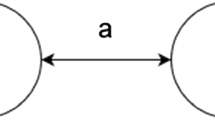Abstract
We formalize what it means to have permission to say something. We adapt the dynamic logic of permission by van der Meyden (J Log Comput 6(3):465–479, 1996) to the case where atomic actions are public truthful announcements. We also add a notion of obligation. Our logic is an extension of the logic of public announcements introduced by Plaza (1989) with dynamic modal operators for permission and for obligation. We axiomatize the logic and show that it is decidable.
Similar content being viewed by others
References
Ågotnes, T., Balbiani, P., van Ditmarsch, H., & Seban, P. (2010). Group announcement logic. Journal of Applied Logic, 8, 62–81.
Aucher, G., Boella, G., & van der Torre, L. (2010). Privacy policies with modal logic: The dynamic turn. In G. Governatori, & G. Sartor (Eds.), Proceedings of 10th DEON. LNCS 6181 (pp. 196–213). New York: Springer.
Balbiani, P., van Ditmarsch, H., & Seban, P. (2009). Reasoning about permitted announcements. In A. Herzig, & E. Lorini (Eds.), (Electronic) proceedings of: ESSLLI 2009 workshop logical methods for social concepts, Bordeaux, France.
Baltag, A., Moss, L.S., & Solecki, S. (1998). The logic of public announcements, common knowledge, and private suspicions. In I. Gilboa (Ed.), Proceedings of the 7th conference on theoretical aspects of rationality and knowledge (TARK 98) (pp. 43–56).
Baltag, A., van Ditmarsch, H., & Moss, L.S. (2008). Epistemic logic and information update. In J. van Benthem, & P. Adriaans (Eds.), Handbook on the philosophy of information (pp. 361–456). Amsterdam: Elsevier.
Blackburn, P., de Rijke, M., & Venema, Y. (2001). Modal logic. Cambridge tracts in theoretical computer science 53. Cambridge: Cambridge University Press.
Boh, I. (1993). Epistemic logic in the later middle ages. Evanston, IL: Routledge.
Chisholm, R.M. (1964). The ethics of requirement. American Philosophical Quarterly, 1, 147–153.
Fagin, R., Halpern, J.Y., Moses, Y., & Vardi, M.Y. (1995). Reasoning about knowledge. Cambridge, MA: MIT Press.
Fischer, M., & Ladner, R. (1979). Propositional dynamic logic of regular programs. Journal of Computer and System Sciences, 18(2), 194–211.
Horty, J.F. (2001). Agency and deontic logic. London, UK: Oxford University Press.
Hoshi, T. (2008). Logics of public announcements with announcement protocols. Manuscript. Philosophy Department, Stanford University.
Mally, E. (1926). Grundgesetze des Sollens: Elemente der Logik des Willens. Leuschner und Lubensky, Universitaäts-Buchhandlung, Graz.
Meyer, J.-J.Ch. (1987). A different approach to deontic logic: Deontic logic viewed as a variant of dynamic logic. Notre Dame Journal of Formal Logic, 29(1), 109–136.
Moore, G.E. (1942). A reply to my critics. In P.A. Schilpp (Ed.), The philosophy of G.E. Moore (pp. 535–677). The Library of Living Philosophers (volume 4). Evanston, IL: Northwestern University.
Parikh, R., & Ramanujam, R. (2003). A knowledge based semantics of messages. Journal of Logic, Language and Information, 12, 453–467.
Plaza, J.A. (1989). Logics of public communications. In M.L. Emrich, M.S. Pfeifer, M. Hadzikadic, & Z.W. Ras (Eds.), Proceedings of the 4th international symposium on methodologies for intelligent systems: Poster session program (pp. 201–216). Oak Ridge National Laboratory.
Plaza, J.A.: Logics of public communications. Synthese, 158(2), 165–179. (2007). Reprint of Plaza’s 1989 workshop paper.
Pucella, R., & Weissman, V. (2004). Reasoning about dynamic policies. In I. Walukiewicz (Ed.), FOSSACS 2004. LNCS 2987 (pp. 453–467). New York: Springer.
Ross, A. (1941). Imperatives and logic. Theoria, 7, 53–71.
van Benthem, J., Gerbrandy, J.D., Hoshi, T., & Pacuit, E. (2009). Merging frameworks for interaction. Journal of Philosophical Logic, 38, 491–526.
van der Meyden, R. (1996). The dynamic logic of permission. Journal of Logic and Computation, 6(3), 465–479.
van Ditmarsch, H., & French, T. (2009). Simulation and information. In J. Broersen, & J.-J. Meyer (Eds.), Knowledge representation for agents and multi-agent systems. LNAI 5605. Presented at LOFT 2008 and KRAMAS 2008 (pp. 51–65). New York: Springer.
van Ditmarsch, H., van der Hoek, W., & Kooi, B.P. (2007). Dynamic epistemic logic. Synthese Library (vol. 337). New York: Springer.
von Wright, G.H. (1951). An essay in modal logic. Amsterdam: North Holland.
Wang, Y. (2010). Epistemic modelling and protocol dynamics. PhD thesis, Universiteit van Amsterdam.
Author information
Authors and Affiliations
Corresponding author
Rights and permissions
About this article
Cite this article
Balbiani, P., Seban, P. Reasoning About Permitted Announcements. J Philos Logic 40, 445–472 (2011). https://doi.org/10.1007/s10992-011-9187-1
Received:
Accepted:
Published:
Issue Date:
DOI: https://doi.org/10.1007/s10992-011-9187-1




